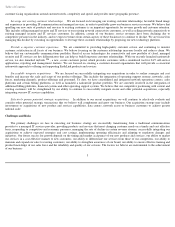Earthlink 2011 Annual Report Download - page 15
Download and view the complete annual report
Please find page 15 of the 2011 Earthlink annual report below. You can navigate through the pages in the report by either clicking on the pages listed below, or by using the keyword search tool below to find specific information within the annual report.
Table of Contents
access services no longer have a significant, if any, price advantage over certain broadband services. Most of the largest providers of broadband
services, such as cable and telecommunications companies, control their own networks and offer a wider variety of services than we offer,
including voice, data and video services. Their ability to bundle services and to offer broadband services at prices below the price that we can
profitably offer comparable services puts us at a competitive disadvantage. In addition, our only significant access to offer broadband services
over cable is through our agreement with Time Warner. Telecommunications companies are also marketing their broadband services over fiber,
which provides higher speeds than DSL at very competitive prices. We do not have a resale or wholesale agreements for these fiber solutions,
which puts us at a competitive disadvantage.
We experience pricing pressures for certain of our consumer access services, particularly our consumer broadband services, due to
competition, volume-
based pricing and other factors. Some providers, including AT&T, have reduced and may continue to reduce the retail price
of their Internet access services to maintain or increase their market share, which could cause us to reduce, or prevent us from raising, our prices.
We may encounter further market pressures to: migrate existing customers to lower-
priced service offerings; restructure service offerings to offer
more value; reduce prices; and respond to particular short-term, market-
specific situations, such as special introductory pricing or new product or
service offerings. Any of the above could adversely affect our revenues and profitability.
Regulatory Environment
Our services are subject to varying degrees of federal, state and local regulation and, in light of our recent acquisitions and the growth of
our Business Services segment, will be more affected by regulation than in the past. Federal, state and local regulations governing our services
are the subject of ongoing judicial proceedings, rulemakings and legislative initiatives that could change the manner in which our industry
operates and affect our business.
Overview
Through our wholly-
owned subsidiaries, we hold numerous federal and state regulatory authorizations. The Federal Communications
Commission ("FCC") exercises jurisdiction over telecommunications common carriers to the extent that they provide, originate or terminate
interstate or international communications or as otherwise required by federal law. The FCC also establishes rules and has other authority over
some issues related to local telephone competition. State regulatory commissions, commonly referred to as public utility commissions ("PUCs"),
generally retain jurisdiction over telecommunications carriers to the extent that they provide, originate or terminate intrastate communications.
PUCs also have authority to review and approve interconnection agreements between incumbent telephone carriers and competitive carriers such
as us, and to conduct arbitration of disputes arising in the negotiation of such agreements. Local governments may require us to obtain licenses,
permits or franchises to use the public rights-of-
way necessary to install and operate our network. Our operations are also subject to various
consumer, environmental, building, safety, health and other governmental laws and regulations.
The regulatory environment relating to our Business Services segment continues to evolve. Bills intended to amend the Communications
Act of 1934, as amended by the Telecommunications Act of 1996 ("Communications Act") are introduced in Congress from time to time and
their effect on us and the communications industry cannot always be predicted. Proposed legislation, if enacted, could have a significant effect
on our business, particularly if the legislation impairs our ability to interconnect with incumbent carrier networks, lease portions of other carriers'
networks or resell their services at reasonable prices, or lease elements of networks of the ILECs under acceptable rates, terms and conditions.
We cannot predict the outcome of any ongoing legislative initiatives or administrative or judicial proceedings or their potential impact upon the
communications and information technology industries generally or
10
























